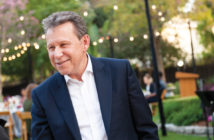When I sit down to write these letters, I often find myself with the intriguing challenge of weaving together seemingly disparate themes. On first glance, this issue of Och Tamale might appear a particularly head-scratching prospect. Where is the thread that connects a winning poker player, a world renowned landscape photographer, and a community service learning program celebrating 25 successful years?
What strikes me in the stories that fill these pages is that, as different as they are, they all shed light on emotional and intellectual journeys involving risk and flexibility—the willingness to be open to opportunities as they present themselves, even (and especially) if they clash with carefully considered plans. This winding pathway is, in the Jeffersonian sense, what liberal arts universities mean by the “pursuit of happiness.”
Robert Adams ’59, the award winning photographer whose work graces this magazine, started out as an English major at Redlands in the late 1950s. It was only after he had earned his Ph.D. and returned to his native Colorado to become an English professor at Colorado College (his own “carefully considered plan”) that he found himself impelled in a new direction by the changes “progress” had wrought on the land he loved. He picked up a camera to chronicle those changes and the rest is, well, art history. His spare, evocative images now hang in the nation’s great art museums. In 1994 he was one of the handful of Americans awarded the highly prestigious annual MacArthur Fellowship, or “Genius” grant, and in 2014 he was elected to the American Academy of Arts and Letters.
For poker expert and Redlands graduate Darren Elias ’08, who has earned more than $6 million in tournament winnings in the past eight years, it was less about a shift in direction than listening to his instinct from the beginning. While his decision to become a professional poker player may have received a lukewarm reception from his parents (and perhaps a few Redlands professors), Elias knew that this was where his passion lay. He finds the game completely engaging, psychologically challenging, and thought provoking. This is where he can express himself mentally and exercise his creativity.
Tony Mueller, our director of community service learning, knows all about changing direction. After growing up on a Minnesota farm, he traveled west to Hollywood to pursue his acting dreams, only to realize he was much happier working with people to create simultaneous service and deep learning. He also knows how transformative those experiences can be for students, taking them outside the confines of what they know and can imagine about themselves and introducing them to unexpected places, both literally and in a larger sense.
And the list goes on. Michael Moon ’89 took a path from Johnston, where he loved to compose music, to service in the Peace Corps, to a career in ranch operations and environmental stewardship of ranch lands throughout the west. Val Jensen ’03’s own post-Johnston route included acting studies, work in journalism, and two master’s degrees; he now works with the U.S. State Department’s Bureau of Diplomacy. The people in these pages all had the courage to embrace the unknown and take a road “less traveled.” They have not “ended up” where they thought they would. But they are all thriving, with work that gives their lives meaning.
Exploring possibilities, in college and beyond, clearly can lead to good things. I must confess I did not explore sufficiently in college. I was among those students who had to take a strictly linear approach to their education. Staying within a prescribed curriculum, I did exactly what was needed to get into medical school. We were offered the chance to be expansive through the ‘60s Western civilization requirement of my liberal arts college. But would I have stepped further into the murky (for me) waters of history and political science and sociology of my own volition? I did choose a few electives in comparative religions, philosophy, physical chemistry, and economics, but I was constrained by excessive requirements so that I could never do enough of the exploration that I now preach. Having completed what I realize was the antithesis of the Johnston experience, I have to conclude it would have been better to have experimented more with the world and been more expansive in my studies. Perhaps I compensated later by exploring music in depth.
With my own life lessons in mind, I now wholeheartedly urge all our students (and those beyond their student years) to take intellectual risks, to be profoundly curious, and to give full rein to the imagination when it comes to possibilities and paths. As has often been said, most of the occupations that will exist in 20 years have not even been invented yet. So, beyond the very real possibility of finding joy and true meaning, being open and adaptable and curious is surely fast becoming the only pragmatic approach to an uncertain future.
The possibility of a change of direction or a shift of perspective can inspire either anxiety or feelings of liberation. Often, both will coexist. What I have learned, and continue to learn, is that there are immense possibilities in the unknowable. I am fortunate to be in a place that has long known this happy truth. Thus . . . there is verity to be found in the Forefathers’ now seemingly quaint, yet true, idea that life is not only about liberty but about the pursuit of happiness.
With warmest regards,
Ralph W. Kuncl, PhD MD
President
University of Redlands




